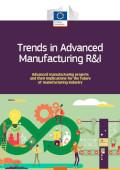Why does the EU support research and innovation for advanced manufacturing?
The manufacturing industry is an important driver of employment and prosperity. Research institutes and companies in Europe, in particular small and medium sized companies, are key players in research and innovation.
Manufacturing companies represent 64% of private sector research development expenditure and 49% of innovation expenditure in Europe.
The sector accounts for:
- 28.5 million people employed in almost 2 million enterprises, out of which 99.2% are SMEs
- the EU27 has 22% of the world’s manufacturing output, yielding a trade surplus in manufactured goods of €421 billion annually
Advanced manufacturing represents a Key Enabling Technology. It uses new knowledge and innovative and cutting-edge technologies such as robotics, 3D printing, artificial intelligence, high-performance computing and modelling, to produce complex products like aeroplanes and medical devices. It also optimises processes towards products having no defects, avoiding any waste, reducing industrial pollution, material consumption and energy use.
Europe is strong in advanced manufacturing technologies, with the highest share of world patent applications and the highest number of venture capitalist backed firms.
Trends in advanced manufacturing research and innovation
In November 2023, the Commission published a report which looks at the portfolio of EU projects supporting advanced manufacturing, mostly under the Factories of the Future and Made in Europe partnerships. From the beginning of Factories of the Future projects in 2010 and up to the time of publishing this report, a total of EUR 2.2 billion has been invested in these R&I projects (four more years of public investments remain under the Made in Europe partnership). The report also analyses the trends in manufacturing industry and the vision of the various stakeholders.

- Report
- 28 November 2023
Advanced manufacturing projects and their implications for the future of manufacturing industry
Horizon Europe Partnership Made in Europe (MiE)
Made in Europe is a Horizon Europe co-programmed public-private partnership running for 7 years with a budget of €1.8 billion in total. The European Factories of the Future Research Association (EFFRA) represents the private side in the partnership. Made in Europe is successor to the Factories of the Future Partnership which has been run under the Horizon 2020 programme.
Made in Europe seeks to increase the number and attractiveness of jobs in manufacturing, while securing the environmental, economic and social sustainability for future generations in Europe.
The partnership will contribute to a competitive, green, digital, resilient and human-centric manufacturing industry in Europe. It will be at the centre of a twin ecological and digital transition, being both a driver and subject to these changes. The 2030 vision for the partnership is to reinforce the global position Europe’s manufacturing industry in terms of competitiveness, productivity, and technology leadership.
European Chips Act
Europe has recently experienced semiconductor shortages and depends on other global players. With the European Chips Act the EU will strengthen its technological leadership, mobilise public and private investments to anticipate and swiftly respond to any future supply chain disruptions.
It is crucial to increase production of cutting-edge semiconductors in the EU to at least 20% of world production by 2030.
To support the circular economy, research and innovation will strengthen chips circularity, reduce electronic waste and lower the environmental cost of semiconductor manufacturing.
Research and innovation on new advanced materials will be critical to develop the next generation of smaller and more energy-efficient chips.
The EU has announced the Chips for Europe innovative where more than €43 billion will be made available. This public investment includes €11 billion to finance technology leadership in research, design and manufacturing capacities.
The Chips for Europe Initiative is closely linked to Horizon Europe and will rely on continuous research and innovation to develop the next generation of smaller and more energy-efficient chips.
